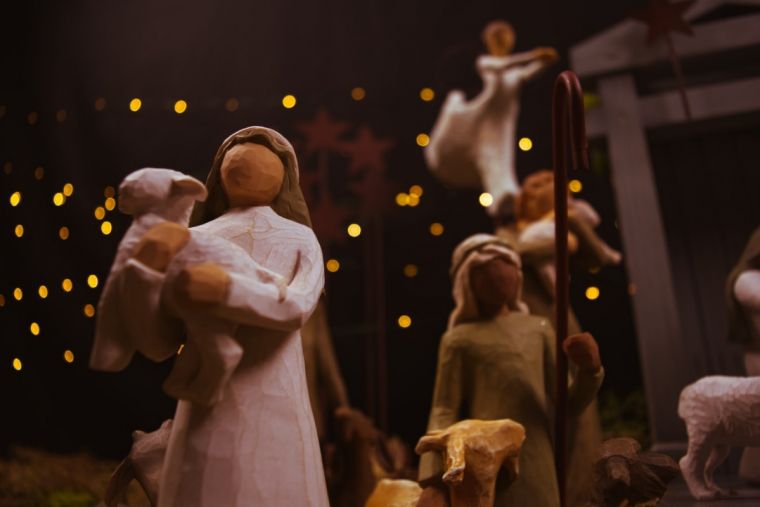Three lessons we can learn from Mary in her extraordinary role as mother of the Messiah

In thinking about heroes, I have come to realise that there are two sorts. There are 'heroes in the spotlight', men and women who receive all the attention; and there are 'heroes in the shadows', those who are overlooked. The difference is clearly seen in two of the central figures of the Christmas story: Mary and Joseph.
Let's look at Mary the mother of Jesus as someone who is very much a hero in the spotlight.
When you carefully read the first two chapters of Luke's gospel, it is clear that Mary is a remarkable woman with a remarkable task. For a start, she has one of the most extended encounters with an angel of anybody in the Bible. And it's not just any angel: it's Gabriel who has the privilege of standing in the presence of God (Luke 1:19).
Most encounters between humans and angels in the Bible are rather one-sided affairs in which the angel speaks and the human quakes. This is different. Mary, still in her teens, is told (twice!) that she has found favour with God and given the promise that she will give birth to a child who will be 'the Son of the Most High' and be called Jesus.
At this point Mary fearlessly challenges Gabriel by suggesting that he may have overlooked a significant biological problem: her virginity. This encounter ends with Mary giving one of the great statements of faith in the Bible: 'I am the Lord's servant ... May your word to me be fulfilled' (Luke 1:38 NIV). In Luke 1:46–55, we have a record of Mary's great hymn, the Magnificat, which reveals that her mind was filled with Scripture.
In the actual birth of Jesus, Mary again takes the spotlight. Luke tells us that the shepherds go to find not 'Joseph and Mary' as you would expect but 'Mary and Joseph'. After the shepherds tell everybody what the angelic host had said to them, we read that Mary 'treasured up all these things and pondered them in her heart' (Luke 2:19 NIV). When Mary and Joseph take the baby Jesus to be consecrated in the temple, it is to Mary that Simeon gives his solemn prophecy (Luke 2:34–35).
This spotlighting of Mary occurs later when Mary clearly struggled with what her son was both doing and saying and was present watching Christ's crucifixion. The last mention of Mary is in Acts 1:14 where we see her as part of the praying community of the very earliest church.
Let me suggest three lessons we can draw from Mary, particularly in the context of the Nativity story.
First, Mary was ready for this extraordinary role. It's easy to see her as being utterly unprepared for her role as mother of the Messiah. She was a young girl in a village whose aspirations presumably went no further than her imminent marriage. Yet, in a deeper sense, she was ready. She knew God and had 'found favour' with her and, from the evidence of the Magnificat, she knew her Scriptures well. She was prepared for the unexpected. To know God and his Word is the best way to be ready for whatever life throws at us.
Second, Mary was responsive in accepting her role. Although her meeting with Gabriel must have lasted only a few minutes it would have been long enough for her to realise the risk and pain in what she was going to undergo. It was going to pose a threat to her betrothal to Joseph and, as an unmarried mother, she would face at least suspicion and possibly stoning for what would inevitably be seen as immorality.
Whereas most of us would have been inclined to try to negotiate 'easier terms' with Gabriel, Mary doesn't. Instead she simply responds with those heroic words of acceptance. We live in an age where our own comfort has become almost the supreme value; yet God can often suddenly call us to step beyond where we are comfortable. In Mary's courageous and immediate response, we see an example to challenge us.
Third, Mary was reflective in her role. Twice, Luke tells us that Mary 'treasured up all these things' and that she pondered them in her heart (Luke 2:19, 51). In other words, Mary did not simply go ahead and mindlessly do what she had to do. She thought, meditated and prayed about what she was undertaking.
So often I hear stories of people in ministry who have become so busy doing their job that they have let their inner spiritual life fade away with disastrous consequences. Mary gave herself to God, body, soul and spirit, and treasured what he was doing through her. It's a good lesson.
In the Christmas story we see Mary as something of a model for the 'hero in the spotlight'. Although many of us will find ourselves playing roles in the shadows, some of us may find ourselves in the spotlight. It may be a position we have chosen or it may be that, like Mary, it is something that we have had thrust upon us. In every case take a lesson from Mary's courageous obedience. Learn to be ready through knowing God and his Word, be prepared to respond when God's request comes and, when you are in the role, be reflective and pray.
Canon J.John is the Director of Philo Trust. Visit his website at www.canonjjohn.com or follow him on Facebook, Instagram or Twitter.











